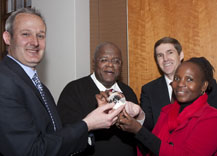Latest News Archive
Please select Category, Year, and then Month to display items
12 October 2020
|
Story Arina Engelbrecht
|
Photo Supplied
 Arina Engelbrecht from Organisational Development and Employee Well-being believes physical activity has a number of benefits for one’s health, including stress relief.
Arina Engelbrecht from Organisational Development and Employee Well-being believes physical activity has a number of benefits for one’s health, including stress relief.
Being physically active plays a big role in preventing the development of mental-health problems and in improving the quality of life of people experiencing mental-health problems.
Treatment for depression
Physical activity can be an alternative treatment for depression. It can be used as a stand-alone treatment or in combination with medication and/or psychological therapy. It promotes all kinds of changes in the brain, including neural growth, reduced inflammation, and new activity patterns are formed that promote feelings of calm and well-being. It releases endorphins – powerful chemicals in the brain that energise your spirit and make you feel good.
Physical activity can be very effective in relieving stress. Research in adults has found that physically active individuals tend to have lower stress levels compared to individuals who are less active. It also leads to improved sleep. When a person sleeps better and feels more rested, overall quality of life improves. They cope better with daily life stressors.
Reduce Alzheimer's risk
Regular physical activity can reduce your risk of developing Alzheimer's disease by up to 50%. It can also slow down further deterioration in those who have already started to develop cognitive problems. It stimulates the brain’s ability to maintain old connections as well as to make new ones.
A study asked people to rate their mood immediately after periods of physical activity (e.g. going for a walk/run, cycling, doing housework) and periods of inactivity (e.g. reading a book or watching television). Researchers found that participants felt more content, more awake, and calmer after being physically active compared to after periods of inactivity.
In conclusion, people who are physically active feel a sense of well-being, feel more energetic throughout the day, sleep better at night, have sharper memories, and feel more relaxed and positive about themselves and their lives.
“Being physically active not only changes your body, it changes your mind,
attitude, and your mood.” – Arina Engelbrecht
American diplomatic staff honoured
2012-07-11
 |
|
With Prof. Jonathan Jansen, Vice-Chancellor and Rector, are from the left, Mr Brian Denver, Ms Selaelo Ramoleta and Mr Earl Miller.
Photo: Hannes Pieterse
11 July 2012
|
The university has honoured a group of high-ranking staff members of the American Embassy in South Africa and Consulate in Johannesburg for their contribution to the university. Amongst them is the Consul-General, Mr Earl Miller.
Mr Miller and five colleagues were honoured for their outstanding contribution to transformation of the university. They are Mr Raymond Tripp, Chief Cultural Officer at the embassy in Pretoria; Ms Wendy Kennedy, Consulate Officer at the consulate; Mr Brian Denver, Cultural Officer at the consulate; Ms Selaelo Ramoleta, Cultural Officer at the embassy and Ms Melissa Clegg-Tripp, Public Affairs Officer at the consulate.
Prof. Aldo Stroebel, Director: International Academic Programmes in the Office of the Vice-Chancellor, says the university has been working with the staff of the embassy and consulate for years and that they receive recognition for their support.